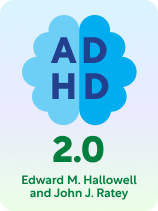
Is it hard for you to keep your attention on something? Do you often show up late to things?
In ADHD 2.0, Edward Hallowell and John Ratey describe what it’s like to live with ADHD, highlighting a few of the most typical challenges that people with this condition face in everyday life. They explain that the inability to shift between two kinds of brain activity lies behind many of these challenges.
Keep reading to understand some common ADHD challenges and what’s going on in the ADHD brain.
Challenge #1: Inattentiveness
People with ADHD are inattentive. They often have trouble staying on task. They get bored easily, yet they find boredom unbearable, so their chronically understimulated minds wander in search of something interesting to think about.
(Shortform note: Anecdotally, people with ADHD experience boredom similarly to how they experience physical pain. In other words, if you have ADHD challenges, boredom can seem like physical torture to you. This may explain why you’d instinctively try to avoid being bored.)
This mental restlessness often manifests as physical restlessness, especially in men—they bounce their legs, drum their fingers, and so on.
(Shortform note: ADHD often presents differently in women than it does in men, which leads to the condition going undiagnosed for many women. For example, women with ADHD experience restlessness and hyperactivity just like men do—however, they’re more likely to cope with that feeling by talking excessively instead of physically fidgeting. How ADHD presents in gender-nonconforming, transgender, and nonbinary people is understudied, but some experts theorize that the gender someone is assigned at birth and socialized as early in life influences how their ADHD presents.)
Challenge #2: Impulsiveness
People with ADHD are impulsive. They tend to make hasty decisions without thinking them through first. They also struggle with delayed gratification—in other words, resisting an immediate temptation for a better reward later. For example, someone with ADHD might miss an event they wanted to go to because they stayed up all night playing video games; the promise of having fun the next day carried less weight than the immediate pleasure of gaming.
(Shortform note: Some experts emphasize that impulsivity is truly action without thought. In fact, if you have ADHD, you might not even know why you engaged in a certain impulsive behavior. If you were the person in the above example, you might not be able to rationally explain—even to yourself—why you chose to stay up late instead of getting a good night’s sleep for the event the next day. It’s likely you’d only know that you wanted the instant gratification of playing video games, so that’s what you did.)
Challenge #3: Difficulty With Time Management
People with ADHD struggle with time management. The authors say that many people with ADHD experience time only in terms of “in the present” and “not in the present.” For example, if they have an important meeting coming up in an hour, that means the meeting is “not in the present”—therefore, they won’t think about it. As a result, they might fail to get ready or may show up late. Similarly, when tackling a long-term project (in other words, one that’s due “not in the present”), people with ADHD will often put it off until the last possible minute.
(Shortform note: This “time blindness” is a common symptom of ADHD, and it affects more than just meeting deadlines or getting places on time. People with ADHD commonly misjudge how long tasks will take, which makes it difficult for them to create realistic schedules. Further, if they tend to procrastinate on big projects, that may be due to a distorted sense of time in the long term—they might think something that happened years ago was only a few months ago, or vice versa, and they probably don’t have a good sense of how long it’ll be until upcoming events either. In other words, if you have ADHD, you might put off projects because the due date (“not in the present”) feels like it’s an eternity away.)
Challenge #4: Forgetfulness
People with ADHD are forgetful. Specifically, they struggle with working memory—short-term memory associated with making decisions and accomplishing tasks. Their minds are so busy and racing so quickly that they sometimes forget what happened just moments ago. For example, someone who goes into the kitchen intending to do the dishes might get distracted by junk food, have a snack, and then leave without doing the dishes.
(Shortform note: Everyone forgets things sometimes, which can cause people to question whether forgetfulness is really a symptom of a psychological condition like ADHD. However, if you have ADHD, you’ve likely had times when your forgetfulness caused serious problems. For example, you might miss appointments, forget to return important phone calls or emails, or forget to pay bills (sometimes resulting in hefty late fees). In short, the difference between regular forgetfulness and forgetfulness as a symptom of a disorder is whether it has a significant, negative impact on your life.)
TPN and DMN
Halloway and Ratey further explain that a lot of the challenges of ADHD come from an inability to shift between two types of brain activity: activity in the task-positive network (TPN) and in the default-mode network (DMN).
Activity in the TPN happens when someone’s absorbed in a task. They concentrate on that single thing to get it done. This state is often called flow or “being in the zone.” In contrast, activity in the DMN puts the person into a thoughtful, imaginative state. It enables them to think about past experiences, plan for the future, and come up with new ideas.
In neurotypical people, these two types of brain activity work one at a time. They switch as needed so the person can come up with ideas and then carry them out or retreat into a daydream for a few minutes to take a quick rest.
(Shortform note: This explanation implies you can only get things done while your TPN is active. However, some other psychology experts say that habitual tasks are often done while the default-mode network (DMN) is active. This is commonly called “autopilot”—it’s why you can do routine things like brushing your teeth without thinking about it and often without any clear memories of having done so.)
However, in people with ADHD, the DMN and TPN are often active at the same time. This means that, even when the person’s trying to focus on a task, their imagination is running wild.
| ADHD’s “Interest-based” Nervous System ADHD researcher William Dodson has another explanation for how a person with ADHD’s brain works. They don’t have trouble switching between modes of thinking—rather, they don’t switch modes when neurotypical people would. In other words, people with ADHD don’t have “worse” or less effective brains—they just operate by different rules. Dodson says that people with ADHD have what he terms an interest-based nervous system. This means they respond to things that intrigue them or stimulate them, and they’re then able to get “in the zone” (TPN). For people with ADHD, a task’s importance is much less significant than how interesting it is, which leads to serious problems with prioritizing. Dodson adds that urgent tasks tend to trigger people with ADHD’s nervous systems as well, which is why they suddenly become extremely productive after putting tasks off until the last minute. In contrast, neurotypical people have what Dodson calls an importance-based nervous system. This means that they respond to things they consider important, and they switch to using their TPN to accomplish important tasks like working, cleaning, and running errands. Interest and urgency are still helpful motivators, but they’re not necessary like they are for someone with ADHD. |

———End of Preview———
Like what you just read? Read the rest of the world's best book summary and analysis of John Ratey and Edward Hallowell's "ADHD 2.0" at Shortform.
Here's what you'll find in our full ADHD 2.0 summary:
- How people can thrive because of—not in spite of—having ADHD
- The biological causes of ADHD and its most prominent symptoms
- Ways to minimize ADHD's downsides and maximize the benefits






